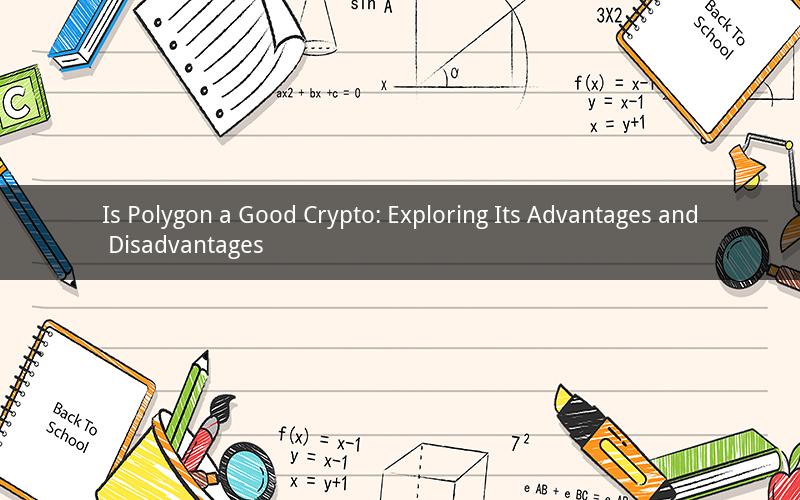
Introduction:
Polygon, also known as Matic Network, has emerged as a popular layer 2 scaling solution for Ethereum. As the crypto market continues to grow, many investors are considering Polygon as a potential investment. In this article, we will delve into the advantages and disadvantages of Polygon, helping you determine whether it is a good crypto to invest in.
Advantages of Polygon
1. Scalability: One of the primary reasons Polygon is a good crypto is its ability to enhance the scalability of Ethereum. Ethereum has faced issues with high transaction fees and slow processing times due to its proof-of-work consensus mechanism. Polygon addresses these problems by creating a layer 2 scaling solution that operates on top of the Ethereum network.
2. Lower Transaction Fees: With Polygon, users can enjoy lower transaction fees compared to Ethereum. This is due to the efficient nature of the layer 2 scaling solution, which reduces the burden on the Ethereum network. Lower transaction fees make Polygon an attractive option for users who want to conduct cost-effective transactions.
3. Fast Processing Times: Polygon significantly improves the processing speed of transactions on the Ethereum network. This means users can complete transactions in a matter of seconds, as opposed to minutes or hours. Fast processing times enhance the overall user experience and make Polygon a more efficient platform.
4. High Security: Polygon inherits the robust security features of the Ethereum network. The network utilizes the proof-of-stake consensus mechanism, which is more energy-efficient and secure than the proof-of-work mechanism used by Ethereum. This ensures that Polygon is less prone to attacks and provides a safe environment for users to conduct transactions.
5. Cross-Chain Integration: Polygon has the capability to interact with other blockchain networks, making it a versatile platform. This cross-chain integration feature allows developers to create decentralized applications (DApps) that can seamlessly interact with other blockchains, such as Binance Smart Chain and Avalanche. This expands the potential use cases of Polygon and attracts a wider audience.
Disadvantages of Polygon
1. Limited Adoption: While Polygon has gained significant attention, it still has a relatively low adoption rate compared to Ethereum. This means that there are fewer users and developers actively using the platform, which may limit its long-term potential.
2. Dependency on Ethereum: As a layer 2 scaling solution, Polygon relies on the Ethereum network for its underlying technology. This means that any issues or changes in the Ethereum network could impact Polygon's performance and stability.
3. Centralization Concerns: Polygon utilizes a proof-of-stake consensus mechanism, which raises concerns about potential centralization. Although the network has implemented measures to mitigate these concerns, the risk of centralization cannot be entirely eliminated.
4. Market Competition: The crypto market is highly competitive, and Polygon faces competition from other layer 2 scaling solutions, such as Optimism and Arbitrum. This competition may limit Polygon's market share and growth potential.
5. Regulatory Risks: As with any crypto asset, Polygon is subject to regulatory risks. Changes in regulations or legal actions against the platform could impact its long-term viability.
Frequently Asked Questions (FAQs)
1. What is Polygon?
Answer: Polygon, also known as Matic Network, is a layer 2 scaling solution for Ethereum that aims to enhance its scalability, lower transaction fees, and improve processing times.
2. How does Polygon compare to Ethereum?
Answer: Polygon is a layer 2 scaling solution built on top of the Ethereum network, aiming to address scalability and performance issues. While Polygon inherits Ethereum's security, it offers lower transaction fees and faster processing times.
3. Can I use Polygon to build decentralized applications (DApps)?
Answer: Yes, Polygon is an excellent platform for building DApps. Its efficient and scalable infrastructure makes it a favorable choice for developers looking to create decentralized applications.
4. Is Polygon more secure than Ethereum?
Answer: Polygon inherits the security features of the Ethereum network and utilizes a proof-of-stake consensus mechanism. This makes it generally more secure than Ethereum, which relies on the proof-of-work mechanism.
5. Can Polygon be integrated with other blockchains?
Answer: Yes, Polygon has the capability to interact with other blockchain networks, thanks to its cross-chain integration feature. This allows developers to create DApps that can seamlessly interact with multiple blockchains.
Conclusion:
In conclusion, Polygon offers several advantages, such as scalability, lower transaction fees, fast processing times, high security, and cross-chain integration. However, it also faces challenges like limited adoption, dependency on Ethereum, centralization concerns, market competition, and regulatory risks. Before investing in Polygon, it is essential to weigh these factors and consider your own investment goals and risk tolerance.